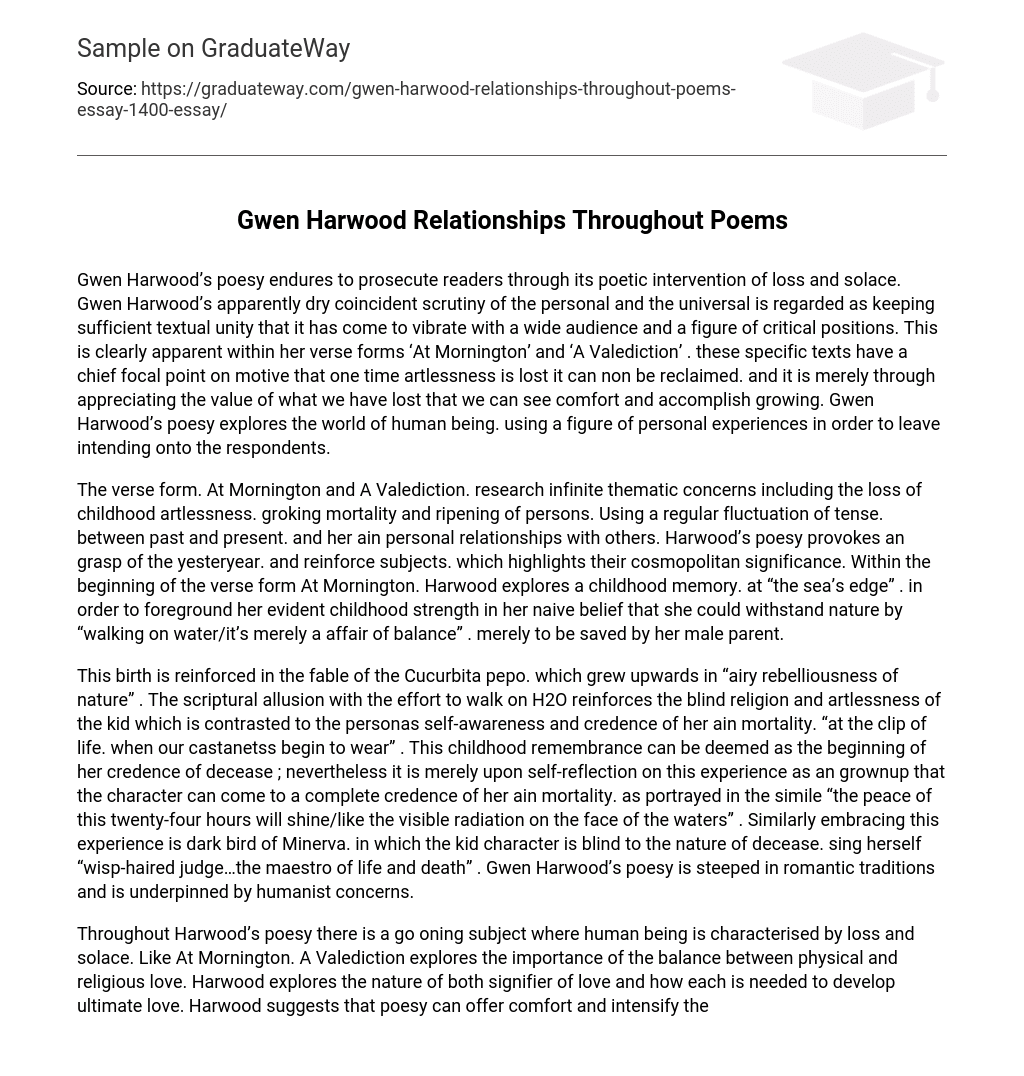Gwen Harwood’s poesy endures to prosecute readers through its poetic intervention of loss and solace. Gwen Harwood’s apparently dry coincident scrutiny of the personal and the universal is regarded as keeping sufficient textual unity that it has come to vibrate with a wide audience and a figure of critical positions. This is clearly apparent within her verse forms ‘At Mornington’ and ‘A Valediction’ . these specific texts have a chief focal point on motive that one time artlessness is lost it can non be reclaimed. and it is merely through appreciating the value of what we have lost that we can see comfort and accomplish growing. Gwen Harwood’s poesy explores the world of human being. using a figure of personal experiences in order to leave intending onto the respondents.
The verse form. At Mornington and A Valediction. research infinite thematic concerns including the loss of childhood artlessness. groking mortality and ripening of persons. Using a regular fluctuation of tense. between past and present. and her ain personal relationships with others. Harwood’s poesy provokes an grasp of the yesteryear. and reinforce subjects. which highlights their cosmopolitan significance. Within the beginning of the verse form At Mornington. Harwood explores a childhood memory. at “the sea’s edge” . in order to foreground her evident childhood strength in her naive belief that she could withstand nature by “walking on water/it’s merely a affair of balance” . merely to be saved by her male parent.
This birth is reinforced in the fable of the Cucurbita pepo. which grew upwards in “airy rebelliousness of nature” . The scriptural allusion with the effort to walk on H2O reinforces the blind religion and artlessness of the kid which is contrasted to the personas self-awareness and credence of her ain mortality. “at the clip of life. when our castanetss begin to wear” . This childhood remembrance can be deemed as the beginning of her credence of decease ; nevertheless it is merely upon self-reflection on this experience as an grownup that the character can come to a complete credence of her ain mortality. as portrayed in the simile “the peace of this twenty-four hours will shine/like the visible radiation on the face of the waters” . Similarly embracing this experience is dark bird of Minerva. in which the kid character is blind to the nature of decease. sing herself “wisp-haired judge…the maestro of life and death” . Gwen Harwood’s poesy is steeped in romantic traditions and is underpinned by humanist concerns.
Throughout Harwood’s poesy there is a go oning subject where human being is characterised by loss and solace. Like At Mornington. A Valediction explores the importance of the balance between physical and religious love. Harwood explores the nature of both signifier of love and how each is needed to develop ultimate love. Harwood suggests that poesy can offer comfort and intensify the human apprehension of life and love. This is portrayed through the usage of irony. rhetorical inquiries. direct address. allusions. metaphors and imagination. This verse form presents the footing on which the sorrow of physical separation can be transformed into joy this is apparent within “my lover will come once more to me. my organic structure to its true terminal will give him joy” and depicts the emphasized tone and assurance in which her hubby will return and is presented through future tense. This reflects on the interrelatedness between flesh and spirit in love and the necessary mix of the religious if love is to last physical separation. Harwood’s A Valediction raises the thought that as worlds we change and develop over clip with a new sense of adulthood and contentment with life. In this verse form Harwood speaks about a farewell as she alludes to past verse form by John Donne.
However. she moves from a actual experience and memory to brooding contemplation in order to make a contrast between the younger and older character. This is used by composing about motion from the yesteryear to the present and including its consequence on the hereafter. The varies of tense further highlights the alterations over clip as she focuses on the dichotomies of ego and the cosmopolitan emotions.
In my ideas. Harwood’s poesy engages readers through its poetic intervention of loss and solace throughout relationships every bit good as its geographic expedition of cosmopolitan subjects about human being and procedures of life. Harwood’s poesy validates the comforting influence of childhood experiences upon grownup development evident in both At Mornington and A Valediction where they both explore one sense of loss and consolidation. Harwood smartly includes characters with their ain feelings and anxiousnesss to mentality on the present and future and the power of memories held with past relationships. Relationships nexus within Harwood’s poesy as throughout life she experiences enduring and includes her personal voice and life within the narrative of her verse form.
In decision. Gwen Harwood trades with the changeless relevant issues of loss and solace by the digesting power of poetic intervention of age and young person. In my sentiment. on the most profound of cosmopolitan truths. there is no certainty in life and we must cover with events and state of affairss as we encounter them. Harwood’s poesy clearly presents a little difference throughout geographic expedition of the relationship between age and young person. which has greatly shaped my ain apprehension of these specific effects. Her unique and personal mode allows the respondent to non merely organize a deep empathy with her words. but besides to critically see one’s ain life and experiences.





